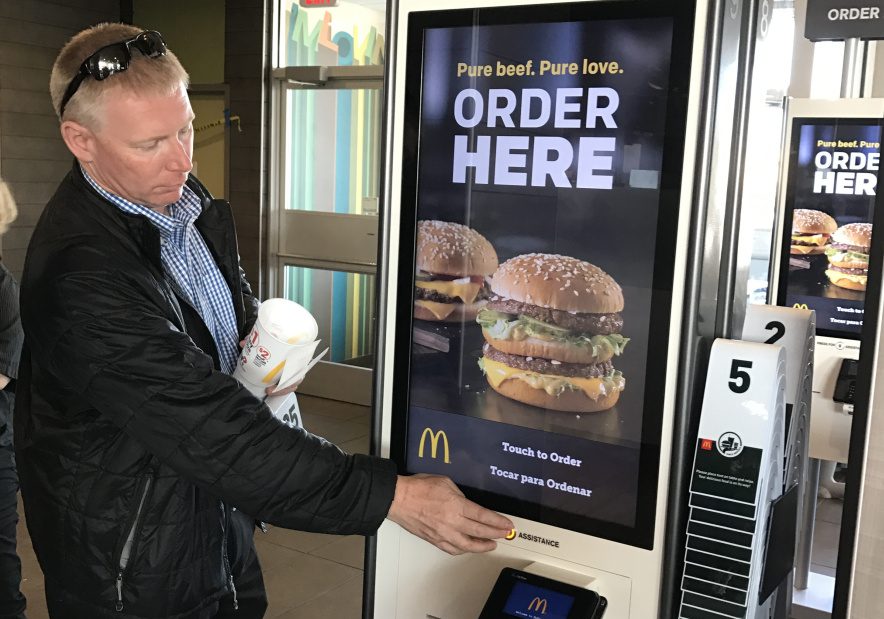OLD TOWN — We Americans laid a highway to the moon and a footpath to the stars; we joined two oceans by digging a giant canal across Panama; and we smashed the atom. We are ages removed from the time when men, with few other inventions than the wheel, lazily plucked grapes from the vine, and gathered heavy pomegranates to their hearts’ content. Millennia later, girls in fast-food restaurants hand ample, round sandwiches in warm paper bags to men on wheels as they roll by the order window.
Before being placed in the bag, the food is cooked on an assembly line consisting of dials and meters, valves, pipes, timers and ovens; and the workers stack and plank the meager beef and thin vegetables together like the shelves of a plastic cabinet. Every serving of potatoes and each hamburger looks the same. Uniformity is the goal, for the sake of efficiency, and for the marginal satisfaction of the customer. There is no distinction made among customers, and no variation between orders. Creativity is forbidden. No extra money is tendered, no special favor is extended and no lagniappe is given.
Thus the fast-food restaurant is democratic, as are other aspects of American society. But one recalls the decade of Michael Milken, the Junk Bond King, and the $2,000 omelet made from caviar and lobster offered at a restaurant in Manhattan. (It used to cost “only” half that.) One also recalls Bill Clinton and Donald Trump, eager to be seen eating at a McDonald’s. We are mindful of the shops along Charles Street on Boston’s Beacon Hill that sell hand-painted dishes inlaid with gold, each costing thousands of dollars.
But the objection that fast-food restaurants, like so much of our American life – our schools, our hospitals and our prisons – are built on a soulless factory model is a facile argument, and it obscures the genius behind the phenomenon. A fast-food restaurant can be enjoyed only by an energetic and industrious people.
So too the energetic Romans had fast-food restaurants in their marketplaces, offering cheese melted on bread with olives and tomatoes; and this was to become the national meal of the modern-day Romans, the Americans. One hand grasped the bread and cheese while the other grasped the theodolite, the sword, and the rod of command. Romans also invented the cafeteria, though cafeterias were for slaves who needed a quick and efficient means of feeding. Along with the pizza, we ought to note the characteristic roundness of much of our other food, our hamburgers, our sandwiches and our pies, and the ease with which they are held with one hand while we unfold a map or open an appointment book with another. And Maine lays claim to inventing the roundest and most wheel-like of foods, the doughnut.
The Romans who owned slaves spent much more time on eating and drinking, reclining on couches as platter after platter was brought out, heaped high with oranges and lemons, roast goose and peacock tongues, and the rarest and most expensive fish brought back from the Black Sea. The philosophers, of whom there were many, were content to go about the marketplace asking others for their meals. Diogenes the Cynic begged his fellow citizens for a crust of bread, and dipped his hands into the cool water of a fountain to avoid the extravagance of using a cup. He lived to be 90.
Should it be a matter of pride that Americans move quickly from the order window to the exit? Or is it a matter of shame to indulge excessively in food and drink, and to be overly long at food, squandering both money and time?
Whether a tattered beggar spends his last two dollars at Wendy’s, or Jeff Bezos spends tens of thousands on a banquet, the end result may be the same. The blessings from any meal are contentment, moderation and thereby health and gratitude toward God.
Send questions/comments to the editors.



Success. Please wait for the page to reload. If the page does not reload within 5 seconds, please refresh the page.
Enter your email and password to access comments.
Hi, to comment on stories you must . This profile is in addition to your subscription and website login.
Already have a commenting profile? .
Invalid username/password.
Please check your email to confirm and complete your registration.
Only subscribers are eligible to post comments. Please subscribe or login first for digital access. Here’s why.
Use the form below to reset your password. When you've submitted your account email, we will send an email with a reset code.